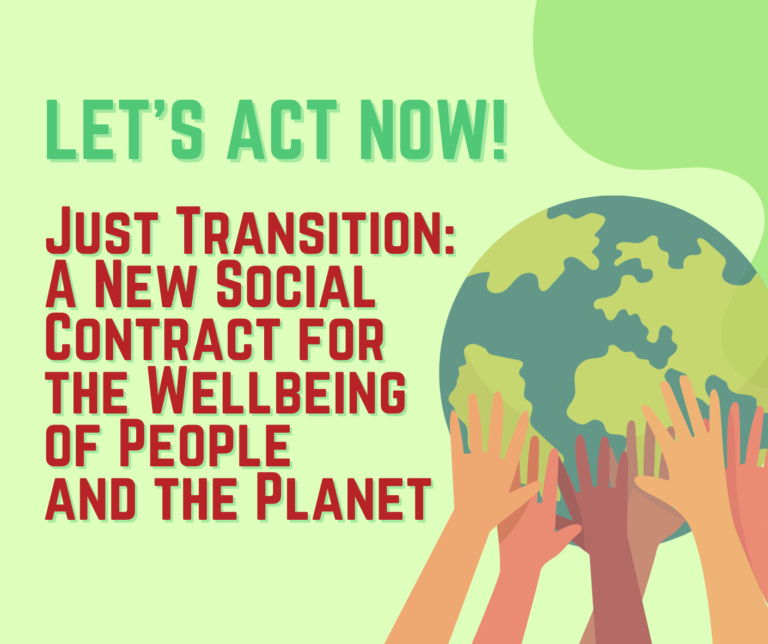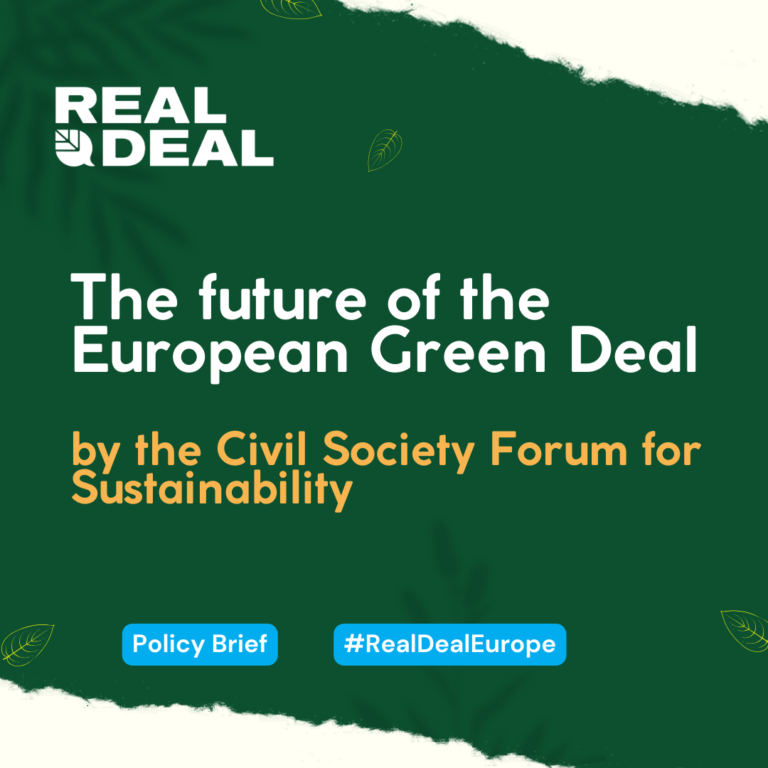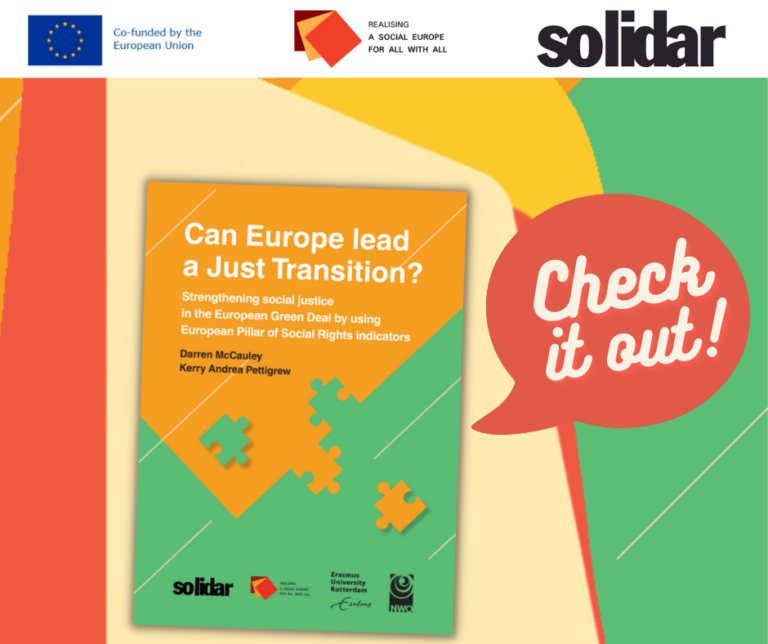Event report – Can Europe lead a Just Transition? Study launch and roundtable discussion
October 10, 2022
Can Europe lead a Just Transition? This question was at the centre of the event that SOLIDAR held on 6 October in Brussels and that brought together EU-level decision-makers, civil society representatives, researchers and other stakeholders in the Just Transition.
The European Green Deal (EGD), the EU’s strategy to reach climate neutrality by 2050, can be praised for its quite ambitious climate targets and the legislative firestorm it has inspired since its announcement at the end of 2019. Unfortunately, the same cannot be said for its social dimension. In the EGD, social justice is mainly seen in terms of “compensation” for the negative impacts that climate policies would have on jobs in carbon-intensive regions and, overall, on people in vulnerable situations.
SOLIDAR believes that the European Pillar of Social Rights (EPSR) and its action plan represent an important tool to strengthen the social dimension of climate and environmental policies. But how can we ensure better integration between the EGD and the EPSR? We asked this question to the speakers and participants in our event.
Frank Siebern-Thomas, Head of Unit F.3 “Fair, Green, and Digital Transitions, Research” at the DG EMPL of the European Commission, opened the event by stating that, while it is urgent to achieve the objective of climate neutrality in Europe, it is crucial to do so in a fair way. According to a new Eurobarometer survey, 88% of EU citizens support a green transition that leaves no one behind. Then, he provided an overview of the European Commission’s work for a Just Transition, which includes the Council Recommendation on ensuring a fair transition towards climate neutrality and the proposal for a Social Climate Fund. Among the upcoming initiatives, Mr. Siebern-Thomas mentioned DG EMPL’s flagship event, the European Employment & Social Rights Forum, which is taking place on 16-17 November in Brussels, as well as activities at the Just Transition pavilion hosted by the ITUC at COP27. He concluded by that yes, the EU has the capacity to lead a Just Transition, but in order to do so we must ensure that the right policies are in place.
The keynote speech was followed by the launch of SOLIDAR’s new study “Can Europe lead a Just Transition? Strengthening social justice in the European Green Deal by using European Pillar of Social Rights indicators”. Prof. Darren McCauley from the Erasmus University Rotterdam, one of the two authors of the study, presented the main outcomes of their research, which analyses the performance of EU Member States based on the relationship between indicators extracted from the EGD and the EPSR. The main conclusions are that every EGD key action must aim to improve social justice and, to do so, should recognise the varying needs of Member States to ensure that the green transition promotes sustainability and social justice. They also point towards the transformative power of embracing a wide understanding of justice that goes beyond unitary or one sector only analyses, and views social justice as encompassing social protection, fair working conditions, equal opportunities and more. Lastly, European and national data collecting authorities need to consider justice related data as important as real-time financial information to allow for radical political re-thinking to be robust, accountable, and effective.
The second part of the event consisted of a roundtable discussion between stakeholders in a socially Just Transition. Ludovic Voet, Confederal Secretary of the European Trade Union Confederation (ETUC), reminded that social inequalities are at the root of climate change, and warned against developing climate policies that increase socioeconomic inequalities. While he welcomed SOLIDAR’s call for better integration between the EGD and the EPSR, Ludovic pointed out one main limitation: while the EGD consists of legally binding policies, the EPSR only sets targets and principles. ETUC believes that, to ensure a Just Transition, climate policies must include social measures and foresee mandatory social impact assessments. As a result, ETUC calls for the adoption of a Just Transition legal framework as part of the EGD. Ludovic concluded that, unfortunately, besides in the framework of the Just Transition Fund, discussions on climate policies rarely take in account their social consequences and impact on the world of work.
Maria Nikolopoulou, Member of the European Economic and Social Commitee (EESC) and Vice-President of the Agriculture, Rural Development and Environment Section (NAT) Section, agreed that, in order to be successful, the EGD must be social. In addition, she stressed that civil society plays an essential role in ensuring a Just Transition. That is why the EESC calls for the creation of tripartite Just Transition Commissions, which would allow regional authorities, social partners and CSOs to participate in the implementation of national and regional Just Transition plans, and founded the European Circular Economy Stakeholder Platform (ECESP) together with the European Commission. Lastly, Maria flagged the lack of an overarching EU framework for the implementation of the SGDs, which would help include social reflections in all policy areas.
Laura de Bonfils, Head of Policy and Advocacy at Social Platform, provided several concrete proposals on how to integrate better the EGD and the EPSR: 1) Use the EPSR’s Social Scoreboard to conduct assessments of the impacts of climate policies on employment, as well as of social policies on the environment. 2) Reform the Stability Growth Pact to promote greater flexibility and to enable necessary social and environmental investments. 3) Reinforce social protection and welfare systems, ensure access to essential services and guarantee adequate minimum income. 4) Combine short-term actions (I.e., direct support to people in vulnerable situations to pay the energy bills) with long-term solutions that tackle the causes of the problem. 5) Foster the participation of trade unions and CSOs in all stages of policymaking, including in the implementation and evaluation. In conclusion, Laura called for all stakeholders to stop working in silos.
Isabelle Brachet, EU Fiscal Reform Policy Coordinator at Climate Action Network Europe (CAN Europe), quoted several of the recommendations on “How to Maximise the Social Benefits of Climate Action” that CAN Europe developed recently. In particular, she mentioned that, when designing climate policies, it is fundamental to identify who might be affected; climate policies must be implemented in a timely and methodical manner; in addition to financial support to cope with high energy prices, it is paramount to make houses more energy efficient; specific support must be provided to overcome the digital divide; funding should not be taken from existing sources; in order to ensure civil dialogue in the green transition, CSOs must be enabled to participate. In conclusion, Isabelle pointed out that the EGD remains a growth strategy, while we need a different economic model, one that goes beyond growth, to meet the climate objectives.
Sebastiano Sabato, Senior Researcher at European Social Observatory (OSE), closed the panel discussion by saying how important it is to defend the objectives of the EGD in today’s difficult political situation. For that, we need a transition-proof welfare state, which preserves its redistributive function and provides a buffer for people in vulnerable situations, as well as incentives for renovating their houses.
During the event, speakers and participants brought up a lot of ideas, proposals and recommendations on how to integrate better the EGD and EPSR. This shows that there’s not just one way to strengthen the social dimension of the European Green Deal. We need to act on different fronts, starting with enhancing social protection systems, ensuring decent jobs for all, increasing investment in education, and creating better equipped and institutionalised mechanisms for social dialogue and the involvement of a strong civil society in all its diversity.
Social justice must become an integral part of all climate and environmental policies. Their social dimension can no longer be tackled “ad hoc”, it must be addressed since the early stages of policymaking and throughout implementation and monitoring. Lastly, climate action should contribute to solving the structural socio-economic inequalities and injustices that pervade our societies and that are among the root causes of the climate emergency, instead of merely trying to mitigate their negative social impacts.





